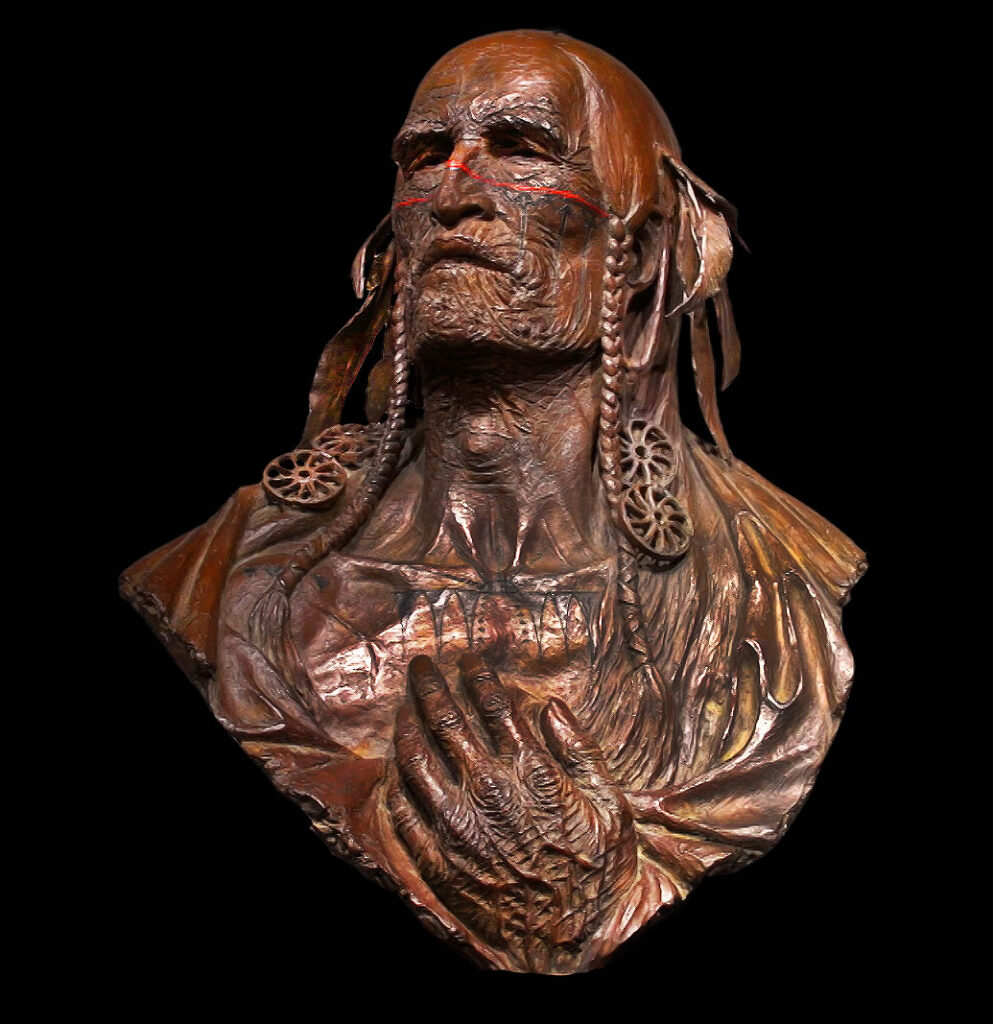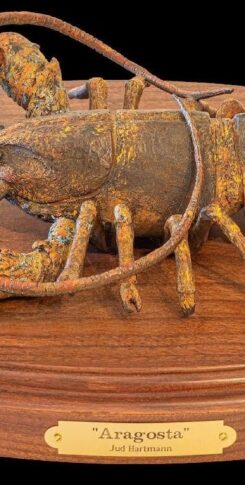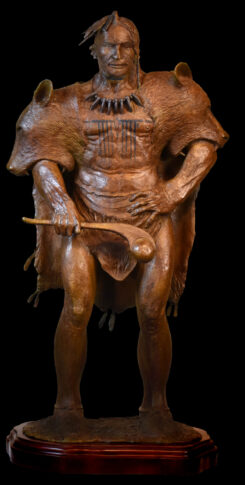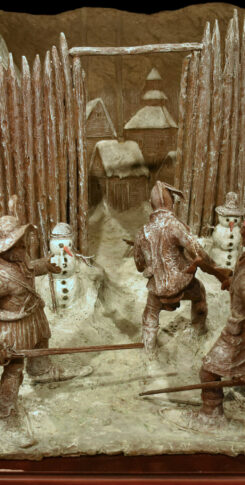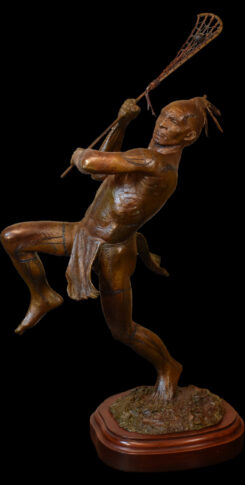Bronze edition: 20 | Height 30″
“Sconondoa, an incredibly old and frail chief of the Oneidas, rose to speak at a treaty negotiation between the British and the Iroquois at Albany, N.Y. The date was July 17, 1752. No one knew how old he was but no white man present knew him except as an incredibly old man and even the fathers and grandfathers of the of the oldest white man present knew him as the old wizard of the Oneidas. His hair was the color of snow and hung nearly to his waist. His limbs were hardly bigger around at the ankles and wrists than broom- sticks. Yet amidst the maze of wrinkles that lined his face, his eyes shown with intelligent light and his voice carried to the ears of all who were present, though it was high pitched and frequently cracked with the strain of projection.
“‘My warriors, my children,’ he began, ‘none among all the Iroquois have lived as long as Sconondoa and only two or three have lived half as long. Yet surely among you there must be some who remember what we are and what we once had. Are there none here who remember that when the cry “The Iroquois are coming!” was alone enough to make the hearts of the bravest warriors of other tribes stand still within their breasts? Are there none here who remember that though other tribes were round about, they were here only by our forebearance and there was none who could stand before us? Are there none who remember that from the blue sea to the east to the green sea to the south, from the land of always – winter in the north to the land of always summer to the west, they feared us and this land was all ours?
“‘But then came the men in their boats from across the sea and they brought us gifts. They asked for friendship and a little land. We were foolish and gave it to them. Then they asked for more and more land. And when we would not give it or sell it they took it from us and we talked and talked. Always it was we who gave in and signed a new treaty and took gifts for what was taken, but the gifts were cheap and worthless and lasted but a day, while the land lasts forever.
“I am an ancient hemlock; winds of many more than a hundred winters have whistled through my branches”
“‘My warriors, my children, still they are nibbling at our land and now they do so under the pretense of protecting us from other white men who would take it. My children, raise up your heads! Open your eyes! Unstop your ears! Can you not see that it makes no difference whether those white men are of the French or the English? All of them threaten our very existance. All of them!
“‘I am Onieda but more than that I am Iroquois!’ He raised his hand to point a skeletal finger at a great old white pine tree towering over them. ‘The Iroquois are like this council tree. It was then full of life and vigor and beauty. It drew its beauty from the ground; it was not cramped and confined; it could draw its sap from all the land, for the Iroquois owned it all and had parted with none of it. the tree put forth more branches and green needles and sent out new roots. It became very strong and beautiful. Just as the tree grew, so did the Iroquois. The white man came. We gave him a portion of the land. A root of the tree withered, a branch died. Again and again another root withered, another branch fell. Now see our tree. Though beautiful, it has lost many branches and no longer sends forth new roots. It is cramped and has not the land to draw sap from which it had.
“‘We will be no more, and his fire will sweep away all trace of us. My village, my nation, my league will be broken like the ice of the river under the rains of spring.”
“‘Long did the strong voice of Sconondoa cry: “Children take care, be wise, be straight.” The words have not always been heard, but one last time he will say them again. He cries to your hearts to listen: Drink no more strong water; it makes you nice to the white men who are cats and they have made many a meal of you. Their mouth is a snare, their way like a fox. Their lips are sweet, but their hearts are wicked! Attach yourselves not to them, but stand alone against all white men. Become again a league of men who fear none but who are themselves feared by all!’
“Again he stopped and now he seemed to shrink inward upon himself until the illusion was strong that he would simply shrivel away to a tragic nothingness. The wrinkled old face rose wet with tears until his eyes rested upon the top of the tree and a faint breeze came up and a whisper of sound drifted down from the top. Then Sconondoa spoke again in a whisper that might have almost been mistaken for the wind itself: ‘I am an ancient hemlock; winds of many more than a hundred winters have whistled through my branches; I am dead at the top and the generation to which I belong has run away and left me. Why I alone live only, the great good spirit knows.'”
“Wilderness Empire” Allan Eckert, 1969

